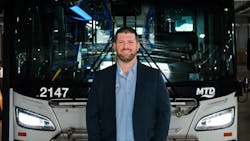One word to describe yourself: Humble
Alma Mater: Indiana University
Fast fact about yourself: Beekeeping was once a hobby of mine. I used to care for over 60,000 bees right in my backyard.
What’s your best experience on transit and what made it memorable? When I lived in North Austin, Texas, I regularly commuted on the 982 from the Pavilion Park & Ride. After completing its southbound route, it conveniently returned to base—right outside my office. It was an easy and cost-effective way for a young professional to get to work. That experience clearly showed me how transit can offer real financial benefits to people from all walks of life.
Brendan C. Sennett comes from a family that has worked in public transit, with his father serving as the general manager for 39 years at CityBus in Lafayette, Ind. Sennett says he learned from his father that public transit offers a landscape of opportunities that extends well beyond the driver's seat, illuminating the potential within the transit industry.
Shortly after graduating from Indiana University, he joined the management trainee program at RATP Dev USA in April 2013. He served in progressive roles in the business for six years, working primarily with CapMetro in Austin, Texas. His culminating role was manager of safety before he left to take a position with the Texas Department of Transportation (TxDOT) in July 2019 as the program manager of state safety oversight. His penchant for safety gained continuous momentum in his professional roles as he developed, implemented and then performed oversight functions on safety management systems, safety promotion, risk mitigation and overall compliance with federal and state requirements.
Since Sennett joined the Champaign-Urbana Mass Transit District (MTD) as the safety and training director in May 2021, he has amassed multiple certifications and advanced trainings, such as the Occupational Safety & Health Administration 30-hour certification, forklift certification, Transit Safety & Security Program (TSSP) for Bus Safety certification, Third Party CDL Safety Officer for the Illinois Secretary of State and the National Incident Management System Incident Command System trainings.
In the four years Sennett has been at MTD, he has averaged more than one advanced certification or course completion annually. This coursework enables him to perform his duties and enhances his awareness and collaboration with other departments. He is adept at the requirements within MTD's Maintenance Facility, can execute the licensing of an operator for their advancement to a commercial license and then jump to serve as MTD’s representative in a county-wide incident command center if the community faces a crisis.
As a commercially licensed driver himself, he maintains a connection to the heart of transit operations. He regularly joins coworkers to investigate troublesome intersections, evaluate a new corridor for service or collect input from the group of over 50 instructors his department oversees.
Building on his commitment to safety, Sennett launched a risk management program to comply with the Federal Transit Administration’s Public Transportation Agency Safety Plan that not only maintained MTD’s compliance but elevated its efforts and overall safety culture. Sennett has helped advance accident data tracking alongside monitoring correlations between accident types, locations and respective employee experiences. This work was accompanied by the deployment of a Hazard Identification Report (HIR) system through MTD’s employee intranet, where employees can anonymously report hazards on MTD property, as well as throughout the community to improve operations and safety.
Since launching in July 2021, 322 HIRs have been submitted, with total reports growing year over year and anonymous submissions declining, indicating increasing employee trust in the process. An event review committee was also established under Sennett’s leadership. Since its formation in 2024, 55 accidents have been reviewed by staff and the committee. The work exemplifies proactive risk mitigation and has yielded low cost, high reward solutions like lot striping, new procedures and updated work rules.
On top of his contributions to MTD, Sennett demonstrates a commitment to advancing the industry by participating in many American Public Transportation Association (APTA) committees including bus safety, rail safety, bus operations and the safety coordinating council. He’s also a graduate of APTA’s Emerging Leaders Class of 2017.
At the state level, he’s engaged in the Illinois Public Transportation Association. He formed and led a subcommittee of training and safety professionals to discuss current challenges and to share resources. He takes pride in advancing that knowledge at the annual conference and was both a moderator and a speaker at the 2024 event.
Locally, Sennett is a regular participant in the community’s multi-city emergency response groups. Updating severe weather response plans was a recent initiative that he spearheaded after the area experienced an uptick in tornado watches. Responding to increasing severe weather and natural disasters is becoming commonplace, and he’s already well positioned to help the agency adapt.
Is there a specific experience that led you to where you are today?
In the summer of 2018, RATP Dev brought several consultants to Austin to train our team on implementing a safety management system. Their presentation was both engaging and inspiring, highlighting the potential impact such a system could have on our operation. It broadened my perspective on risk management, shifting the focus from individual actions to identifying systemic gaps and failure points. This new perspective offered a refreshing and empowering alternative to the traditional industry approach to risk mitigation.
What do you enjoy most about your job?
I strongly believe in continuous improvement. Safety is not something you simply check off—it’s an ongoing journey with constant opportunities to improve. I enjoy working with various departments to discover ways to enhance safety. Whether it's through accident investigations or our hazard reporting program, I value the entire process.
What’s the most challenging part of your job?
Change is tough and can be uncomfortable, especially when organizations have been doing things the same way for years and are asked to try something new. Getting buy-in from coworkers on how changes to their routines can improve safety, as well as overall aspects of their work, is a challenging but winning combination.
What is the accomplishment you’re most proud of and why?
Obtaining my TSSP certification for both bus and rail was an accomplishment in my career. The program involved a fair amount of travel and time away from my family, but the knowledge and experience I gained was invaluable. It deepened my understanding of safety and security practices and connected me with professionals across the country who share similar roles and challenges. Staying in touch and continuing to exchange best practices has been a valuable resource for both my own development and our agency’s ongoing efforts.
What is an accomplishment you would like to work towards in your career?
I want to help build a safety culture that’s seen as a gold standard in the industry. Ideally, we get to a place where other agencies are reaching out to ask how we successfully navigated obstacles to get where we are or what advice we can offer. We’re not there yet, but with youth on my side, a strong team and committed executive leadership, we're ready to put in the work to get us there.
What is your best advice/tip/best practice you can share from your area of expertise?
Never stop asking questions. When questions stop, so does learning. Mastering the skill of asking thoughtful questions not only deepens your understanding but also fosters open communication and builds trust. This creates an environment where people feel comfortable sharing information and challenging assumptions.
About the Author
Megan Perrero
Editor in Chief
Megan Perrero is a national award-winning B2B journalist and lover of all things transit. Currently, she is the Editor in Chief of Mass Transit magazine, where she develops and leads a multi-channel editorial strategy while reporting on the North American public transit industry.
Prior to her position with Mass Transit, Perrero was the senior communications and external relations specialist for the Shared-Use Mobility Center, where she was responsible for helping develop internal/external communications, plan the National Shared Mobility Summit and manage brand strategy and marketing campaigns.
Perrero serves as the board vice president for LIT and is a member of the American Public Transportation Association Marketing and Communications Committee. She holds a bachelor’s degree in multimedia journalism with a concentration in magazine writing and a minor in public relations from Columbia College Chicago.

